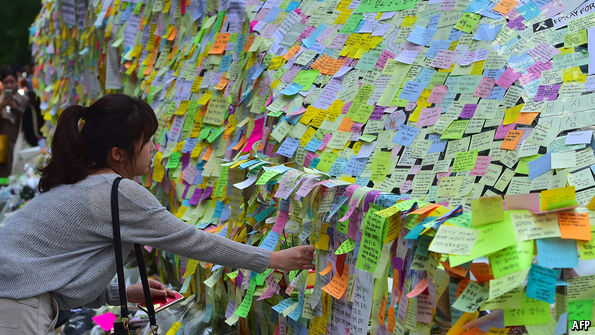
THE murder of a 23-year-old woman in Seoul, the South Korean capital, on May 17th is shocking for at least two reasons. The crime, in which the suspect stabbed the victim to death in public toilets in the bustling district of Gangnam, was a heinous one. But it is also a very uncommon one: South Korea’s homicide rate, at 0.8 murders per 100,000 people, is lower than that of Australia, Norway and France. About 70% of South Korean women say they feel safe walking alone at night. Yet in the four days following the murder, CJMall, a local online shop, reported an eight-fold increase in sales of self-defence gadgets, such as sprays and alarms, almost all to women. Seoul National University, the country’s most prestigious, has already installed a scream-detector in its female toilets. The city government is doubling the number of CCTVs in parks along its river. Why has the case caused such alarm?
The circumstances of the tragedy have sparked intense public debate. Although the police have tentatively concluded that the murder was not a hate crime—the suspect was diagnosed with schizophrenia in 2008, and had been in psychiatric care as recently as last year—the man’s explanation to the police that he “hated women for belittling him” has stunned South Koreans. He had never met the victim before. Apparently, security footage suggests that he passed over six men who entered the unisex toilets before singling her out, simply, it seems, because she was a woman. In the days following the murder, Gangnam Station—to many a symbol of South Korean modernity—was transformed into an impromptu mourning site as hundreds came to lay flowers and tack colourful notes of tribute to the outer wall of exit 10. Within a few days, similar memorials bloomed in provincial cities, such as Busan, Daegu and Daejeon.
Whatever the suspect's motive, South Korean women have been quick to identify with the discrimination. Many of their pinned notes ponder the state of sexual equality in South Korea. That is not surprising in a country that ranks a dismal 115 of 145 countries for gender equality, according to the World Economic Forum, putting it close to Burkina Faso and Zambia, and coming in well below stubbornly patriarchal Japan. South Korea’s gender wage gap is the largest of any rich country. From January to August last year, 87% of the victims who reported violent crimes were women. By law camera phones must produce a shutter sound (as in Japan) because up-skirt filming is so common. But rallies by feminist activists have been met with hostility from male-rights groups, who turned up to stage counter-protests. They say men are being victimised for an atypical attack by a mentally unstable person. one group sent a garland with photographs of sailors who died “only because they were men”, when North Korea torpedoed a South Korean ship in 2010. Women who gathered to rally at the memorial wore masks, for fear of retribution.
That the voices of minor men’s advocacy groups have become shriller is partly a measure of soaring unemployment as South Korea’s economy has slowed. It has hit men hard in a society that still expects them to be the breadwinners and to stump up the money for weddings and first homes. The groups are irate about the nudges that the ministry of gender equality and family (which they want abolished) have given to women, who they feel are moving up professionally while they perform two years of mandatory military service. At their ugliest, they denigrate modern Korean women as gold-diggers dependent upon men, calling them names like kimchinyeo (kimchi woman) and doenjangnyo (bean-paste woman). Yet their clamour for attention is also, to some degree, a measure of women’s advances.